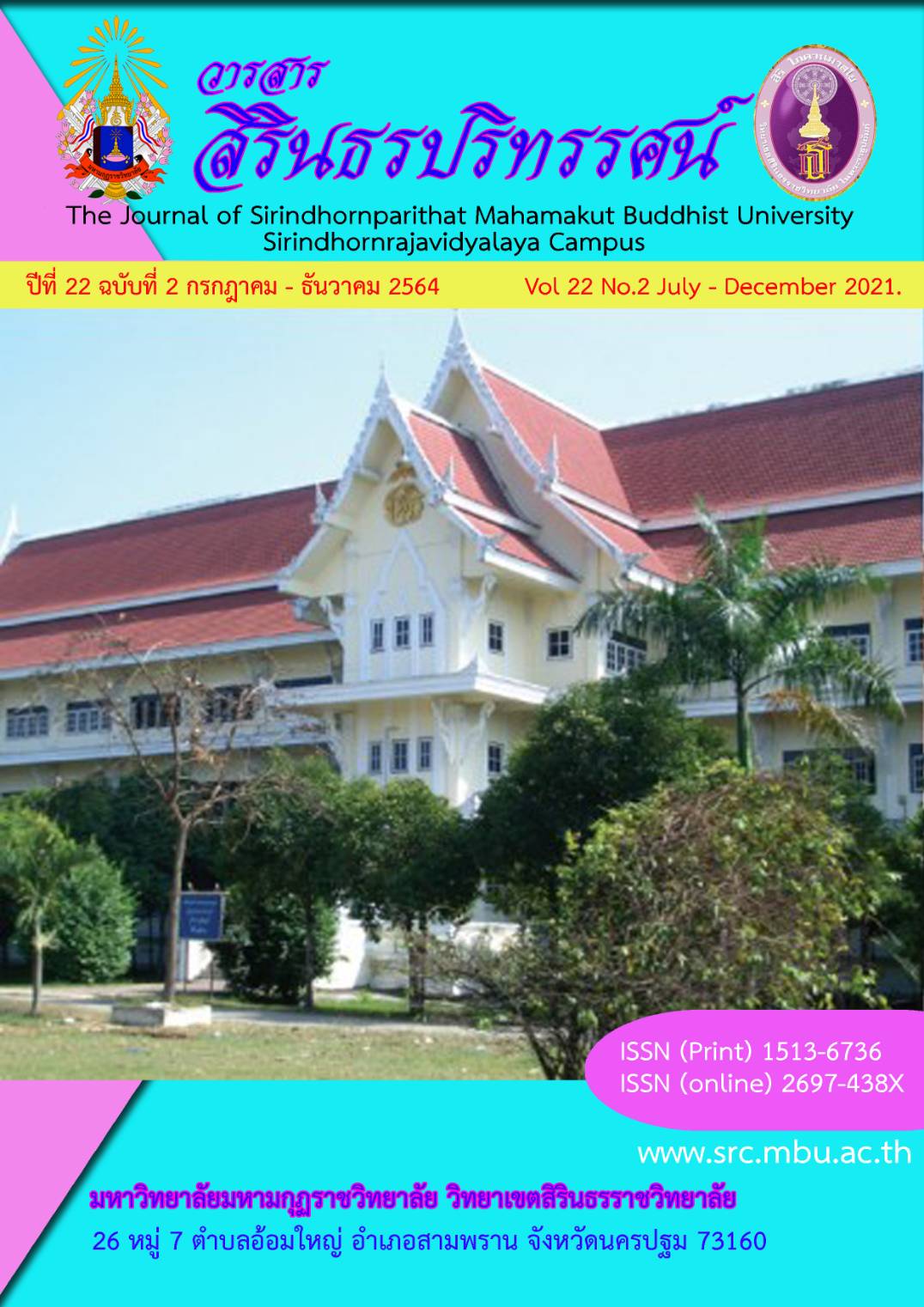SELF-PERFORMANCE ACCORDING TO KALAYANAMITTA-DHAMMA PRINCIPLES OF FIRST YEAR’ STUDENT TEACHERS IN ENGLISH TEACHING MAJOR MAHAMAKUT BUDDHIST UNIVERSITY
Keywords:
Self-perfomance, Kalayanamitta-dhamma, Teacher professionAbstract
The purposes of this research are 1) to study self-perfomance according to Kalayanamitta-Dhamma principles of first year’ student teachers profession in English teaching major Mahamakut Buddhist University 2) to compare self-perfomance according to Kalayanamitta-Dhamma principles of first year’ student teachers profession in English teaching major Mahamakut Buddhist University about sex, age, parent Monthly Income and institution are difference. The example that used for this research as namely, first year’ student teachers profession in English teaching major Mahamakut Buddhist University as number 120 persons, and make Stratified Random Sampling from 169 persons, by Taro Yamane´. The equipment to use research mean questionnaire, statistics for research as namely frequency Percentage significance standard deviation t-test and One-Way ANOVA
The research result were as follows :
1. self-perfomance according to Kalayanamitta-Dhamma principles of first year’ student teachers profession in English teaching major Mahamakut Buddhist University, found that, self-perfomance according to Kalayanamitta-Dhamma principles at overall of them had been more level as significant 4.08, and specify by detail as follow; Piyo (Lovable) had been more level as significant 4.20, Garu (Respectable) had been more level as significant 4.15 and Gambhiranca kakam kata (Able to deliver deep discourser or to treat profound subjects) had been more level as significant 3.90
2. self-perfomance according to Kalayanamitta-Dhamma principles of first year’ student teachers profession in English teaching major Mahamakut Buddhist University about sex, age, parent Monthly Income and institution are difference, found that
2.1 Piyo (Lovable) found that student teachers profession had sex age parent Monthly Income were not different, but student teachers profession had institution difference were self-perfomance according to Kalayanamitta-Dhamma were different
2.2 Garu (Respectable) found that student teachers profession had sex age parent Monthly Income were not different, but student teachers profession had institution difference were self-perfomance according to Kalayanamitta-Dhamma were different
2.3 Bhavaniyo (adorable) found that student teachers profession had sex age parent Monthly Income were not different, but student teachers profession had institution difference were self-perfomance according to Kalayanamitta-Dhamma were different
2.4 Vatta Ca (Being a counsellor) found that student teachers profession had sex age parent Monthly Income were not different, but student teachers profession had institution difference were self-perfomance according to Kalayanamitta-Dhamma were not different
2.5 Vacanakkhamo (Being a patient listener) found that student teachers profession had sex age parent Monthly Income were not different, but student teachers profession had institution difference were self-perfomance according to Kalayanamitta-Dhamma were different
2.6 Gambhiranca kakam kata (Able to deliver deep discourser or to treat profound subjects) found that student teachers profession had sex age parent Monthly Income were not different, but student teachers profession had institution difference were self-perfomance according to Kalayanamitta-Dhamma were not different
2.7 No catthane niyojaye (Never exhorting groundlessly) found that student teachers profession had sex age parent Monthly Income were not different, but student teachers profession had institution difference were self-perfomance according to Kalayanamitta-Dhamma were different
References
กฤษฎา สีจันทร์ฮด. (2557). ศึกษาหลักกัลยาณมิตรธรรม 7 ในพระไตรปิฎกสำหรับครู. สารนิพนธ์ ปริญญาพุทธศาสตรดุษฎีบัณฑิต สาขาวิชาพระพุทธศาสนา มหาวิทยาลัยมหาจุฬาลงกรณราชวิทยาลัย.
กัลยา วานิชย์บัญชา. (2548). สถิติสำหรับงานวิจัย. กรุงเทพฯ : ภาควิชาสถิติ คณะพาณิชยศาสตร์และการบัญชี จุฬาลงกรณ์มหาวิทยาลัย.
ธนัญญาภรณ์ ดวงกางใต้. (2556). หลักธรรมในการเป็นกัลยาณมิตรในพระพุทธศาสนาเถรวาท. วิทยานิพนธ์ พุทธศาสตรมหาบัณฑิต บัณฑิตวิทยาลัย มหาวิทยาลัยมหาจุฬาลงกรณราชวิทยาลัย.
พระจะจู ญาณวิชโย (รักษาป่า). (2554). การศึกษาวิเคราะห์ความเป็นกัลยาณมิตรของพระสารีบุตรเถระ. วิทยานิพนธ์ พุทธศาสตรมหาบัณฑิต บัณฑิตวิทยาลัย มหาวิทยาลัยมหาจุฬาลงกรณราชวิทยาลัย.
พระธรรมปิฎก (ป.อ.ปยุตฺโต). (2542). พระพุทธศาสนาพัฒนาคนและสังคม. กรุงเทพฯ : กรมการศาสนา.
พระราชนันทมุนี (ปัญญานันทภิกขุ).(2557). อ้างใน อินถา ศิริวรรณ, ความเป็นครูวิชาชีพ. กรุงเทพฯ : มหาวิทยาลัย มหาจุฬาลงกรณราชวิทยาลัย.
มานพ นักการเรียน, บานชื่น นักการเรียน. (2562). สถาบันการศึกษาตามแนวทางพระพุทธศาสนา, วารสารสิรินธรปริทรรศน์, ปีที่ 20 ฉบับที่ 2, กรกฎาคม-ธันวาคม, หน้า 214-226.
สมศักดิ์ ชวนเชย. (2561). การประยุกต์ใช้หลักกัลยาณมิตรธรรมของนักศึกษาหลักสูตรครูสมาธิ จังหวัดสกลนคร. วิทยานิพนธ์ ปริญญาพุทธศาสตรมหาบัณฑิต สาขาวิชาพระพุทธศาสนา มหาวิทยาลัยมหาจุฬาลงกรณราชวิทยาลัย.
สำนักงานคณะกรรมการการศึกษาแห่งชาติ. (2542). ความรู้เพื่อการพัฒนา. กรุงเทพฯ : องค์การค้าคุรุสภา.
Cronbach, L.J. (1990). Essentials of Psychological testing. 5th ed. New York : Harper Collins.
Downloads
Published
Issue
Section
License
Copyright (c) 2022 Mahamakut Buddhist University

This work is licensed under a Creative Commons Attribution-NonCommercial-NoDerivatives 4.0 International License.
บทความที่ได้รับการตีพิมพ์เป็นลิขสิทธิ์ของ มหาวิทยาลัยมหามกุฏราชวิทยาลัย วิทยาเขตสิรินธรราชวิทยาลัย
ข้อความที่ปรากฏในบทความแต่ละเรื่องในวารสารวิชาการเล่มนี้เป็นความคิดเห็นส่วนตัวของผู้เขียนแต่ละท่านไม่เกี่ยวข้องกับหาวิทยาลัยมหามกุฏราชวิทยาลัย วิทยาเขตสิรินธรราชวิทยาลัย และคณาจารย์ท่านอื่นๆในมหาวิทยาลัยฯ แต่อย่างใด ความรับผิดชอบองค์ประกอบทั้งหมดของบทความแต่ละเรื่องเป็นของผู้เขียนแต่ละท่าน หากมีความผิดพลาดใดๆ ผู้เขียนแต่ละท่านจะรับผิดชอบบทความของตนเองแต่ผู้เดียว




